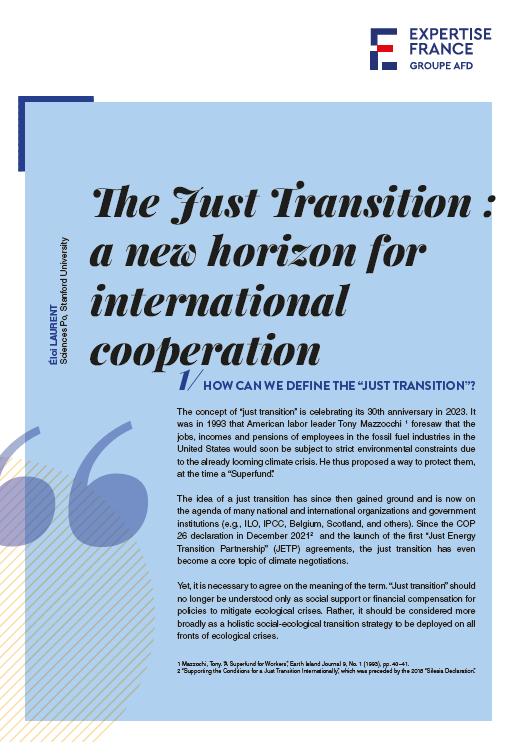Eloi Laurent: "The notion of just transition proposes going beyond the horizon of economic growth".
Ecological and climate crises are increasing in number. What are the possible consequences at the economic level?
They already have considerable economic and social impacts. The so-called natural disasters in 2022, of which only half were covered by insurance, cost around €255 billion around the world, including some €10 billion in France. And that’s only the start of it. The health impacts are even more striking: extreme temperatures are already killing millions of people in the world each year, a figure that will soon become hundreds of millions if the climate crisis isn’t mitigated rapidly. In France, between Covid (a pandemic shock) and heat waves, excess mortality has been about 60,000 people each year since 2020 (higher by about 10%). Mitigation of ecological crises is thus a social emergency, but they can be mitigated only if their social dimension is acknowledged, starting with the issue of inequalities. This is exactly the meaning of “just transition” that I uphold in this policy brief.

Is the notion of just transition compatible with economic growth objectives?
The just transition proposes to go beyond the scope of economic growth, which is neither a satisfactory response to social emergencies, nor an adequate response to environmental challenges. The best empiric proof of this dual inadequacy is that while global GDP has continued to increase over the past three decades (and even tripled between 1990 and 2020), social inequalities within countries have soared, and ecological crises have accelerated to the extent that they put into question the livability of our planet. One of the precepts of the just transition is to give priority, when designing public policies, to human well-being that is dynamic and informed by questions of justice, rather than to the maximization of economic growth. In other words, it’s important to carry out the just transition within the framework of an economy of well-being that we can define as “human development” (health, education, and employment) within the Earth’s limits. It’s crucial that the COP 28 seize on these notions of post-growth, economy of well-being, and just transition.
How can the scope of the just transition be expanded beyond the climate crisis?
First, by expanding it to ecological shocks such as heat waves, droughts, and floods, so that the social inequalities they generate are reduced. Put in a different way, the adaptation approach should be added to the current partnerships which above all seek mitigation of the climate crisis via financing the gradual withdrawal from fossil energy. Next, by expanding the aim of just-transition partnerships to include ecosystem and biodiversity preservation linked to human well-being, using a relational rather than instrumental approach to human resources and nonhuman species, as promoted by IPBES-5. Finally, by consolidating the participative dimension of just-transition policies and especially by ensuring that the rights of indigenous communities are respected, as promoted by the overall strategy of COP 15.

